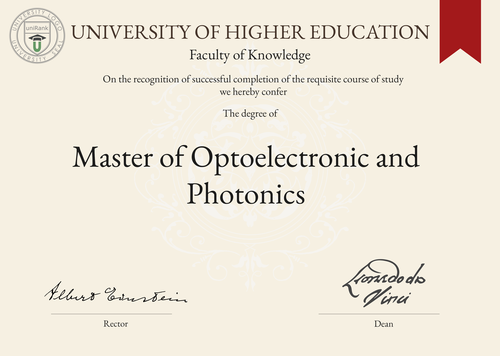
Master of Optoelectronic and Photonics (M.Opt.Ph.)
Guide to Master of Optoelectronic and Photonics Program/Course/Degree
Master of Optoelectronic and Photonics (M.Opt.Ph.)

Program Name:
Master of Optoelectronic and PhotonicsProgram or Degree abbreviation:
M.Opt.Ph.Duration range:
1-2 yearsTuition range:
Varies by country and universityOverview:
The Master of Optoelectronic and Photonics program is designed to provide students with a comprehensive understanding of the principles and applications of optoelectronics and photonics. This interdisciplinary field combines optics, electronics and materials science to develop technologies for the generation, manipulation and detection of light. Students will gain theoretical knowledge and practical skills in areas such as laser systems, fiber optics, nanophotonics and optical communications.Curriculum Overview by year:
- Year 1: - Introduction to Optoelectronics - Optical Waveguides and Fibers - Semiconductor Optoelectronics - Laser Physics and Technology - Photonics Materials and Devices - Year 2: - Advanced Optics and Imaging - Nanophotonics and Plasmonics - Optical Communications - Optoelectronic Sensors and Detectors - Research Project or InternshipKey Components:
- Understanding the fundamentals of optics and photonics - Hands-on experience with optoelectronic devices and systems - Knowledge of advanced topics such as nanophotonics and optical communications - Research project or internship to apply learned conceptsCareer Prospects:
Graduates of the Master of Optoelectronic and Photonics program can pursue various career paths in industries such as telecommunications, semiconductor manufacturing, biomedical imaging and defense. They can work as optoelectronic engineers, photonics researchers, optical design specialists, or product development managers.Salary Expectations:
The salary expectations for graduates of the Master of Optoelectronic and Photonics program can vary depending on factors such as location, industry and level of experience. On average, professionals in this field can earn a competitive salary ranging from $70,000 to $120,000 per year. For a more accurate understanding of salary expectations, you can utilize the Job Sites Search Engine, from our sister site jobRank, which searches over 4,600 job sites worldwide. Make sure to specify not only the job title but also the country you are interested in.Conclusions:
It is important to note that the duration, tuition fees, curriculum, key components, career prospects and salary expectations of the Master of Optoelectronic and Photonics program can vary based on the chosen country or location for studying the program, as well as the chosen university. Prospective students are encouraged to research and compare different universities and countries to find the best fit for their academic and career goals. Visitors can search for where this specific degree, Master of Optoelectronic and Photonics, is offered anywhere in the world through the uniRank World Universities Search Engine.World Universities Search Engine
search for Master of Optoelectronic and Photonics (M.Opt.Ph.) and add the Location (country, state etc.) or specific University you are interested in studying at.
Query examples:
- Master of Optoelectronic and Photonics (M.Opt.Ph.) United States
- Master of Optoelectronic and Photonics (M.Opt.Ph.) United Kingdom online
- Master of Optoelectronic and Photonics (M.Opt.Ph.) Australia international students
- Master of Optoelectronic and Photonics (M.Opt.Ph.) University of California
- Master of Optoelectronic and Photonics (M.Opt.Ph.) University of London tuition fees
- Master of Optoelectronic and Photonics (M.Opt.Ph.) University of Sydney scholarships
Share Program/Course
Interesting? Share this program/course/degree info with your friends now.